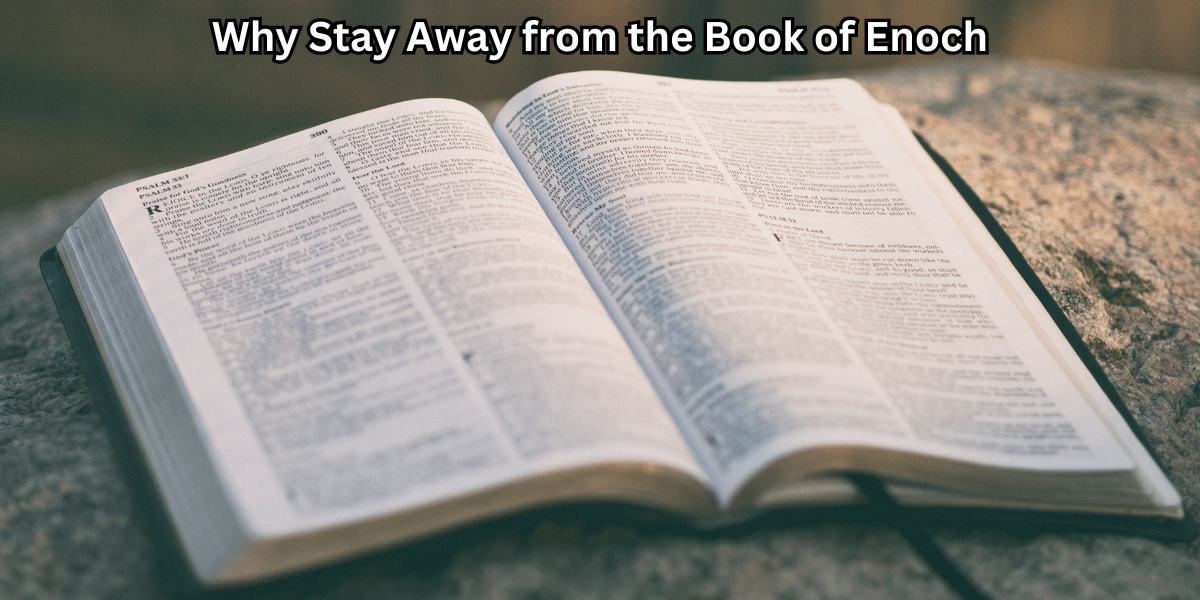
The Book of Enoch, an ancient text often linked to Biblical literature, sparks curiosity and debate among scholars, theologians, and readers. While some view it as a treasure trove of mystical knowledge, others raise concerns about its authenticity and doctrinal reliability. This article explores why you might want to stay away from the Book of Enoch, offering an SEO-optimized, in-depth analysis to guide your understanding.
What Is the Book of Enoch?
The Book of Enoch is a collection of apocryphal writings attributed to Enoch, the great-grandfather of Noah. Though not included in the canonical Bible for most Christian denominations, it has captured attention due to its unique themes, including:
- The Watchers: Fallen angels who descended to Earth.
- Nephilim: Offspring of angels and humans.
- Detailed prophecies about the Messiah and the end times.
Table: Canonical Status of the Book of Enoch
| Christian Tradition | Status |
|---|---|
| Roman Catholic Church | Not Canonical |
| Eastern Orthodox Church | Partial Recognition |
| Protestant Churches | Not Canonical |
| Ethiopian Orthodox Church | Canonical |
Read Also: Understanding SIA 588B AITimes A Comprehensive Guide
Why Stay Away from the Book of Enoch?
1. Lack of Biblical Canonization
One major reason to avoid the Book of Enoch is its exclusion from the Biblical canon. The Council of Nicaea (AD 325) and other early Church councils did not consider it divinely inspired. Without canonical recognition, its teachings lack the authority of Scripture.
2. Doctrinal Inconsistencies
The Book of Enoch introduces concepts not aligned with the Bible, such as:
- Overemphasis on angelology and demonology.
- Speculations about the cosmos.
- Contradictions with Biblical doctrines about sin, salvation, and God’s nature.
These inconsistencies can lead to confusion, especially for those new to Christianity.
3. Questionable Authorship
Though attributed to Enoch, scholars argue that the text was likely written much later, between the 3rd and 1st centuries BCE. Its pseudepigraphal nature—written under a false name—casts doubt on its reliability.
Read Also: Winning with the Gems and Mines game from 1xBet India
How the Book of Enoch Could Mislead Readers
1. Encouraging Speculation Over Faith
The fantastical elements of the Book of Enoch can distract readers from the core tenets of Christianity. This focus on speculative theology undermines the simplicity of the Gospel.
2. Potential for Heretical Teachings
Reading the Book of Enoch without discernment can lead to heretical interpretations, such as:
- Elevating angels to an almost divine status.
- Misunderstanding God’s judgment and grace.
Read Also: Electrolyte Power: How Premium Powders Can Elevate Your Hydration Game
PAS Formula: Problem, Agitation, Solution
Problem
Many Christians feel drawn to the Book of Enoch due to its mysterious reputation and connection to Biblical events. However, its questionable origins and doctrinal issues make it a potential spiritual pitfall.
Agitation
Imagine dedicating hours to studying a text only to find it filled with inaccuracies and teachings that conflict with the Bible. Such exploration can lead to confusion, doubt, and a weakened faith.
Solution
Focus on studying the canonical Scriptures. These provide a reliable foundation for faith, leaving no room for confusion or error. If curiosity persists about the Book of Enoch, approach it with discernment and guidance from trusted theological resources.
Read Also: How To Stop Feeling So Isolated | How To Read Your Human Design Chart
Pros and Cons of Reading the Book of Enoch
Table: Pros and Cons of the Book of Enoch
| Pros | Cons |
| Historical and cultural insights | Doctrinal inconsistencies |
| Fascinating apocalyptic themes | Lack of Biblical canonization |
| Context for early Jewish beliefs | Potential for theological errors |
Conclusion
While the Book of Enoch is a fascinating piece of ancient literature, its exclusion from the Biblical canon and doctrinal inconsistencies make it a risky choice for theological study. For those seeking spiritual growth, the Bible remains the ultimate source of truth and guidance. If curiosity about the Book of Enoch persists, approach it with discernment, prayer, and advice from trusted theological resources.
Read Also: Insanony Understanding the Concept, Benefits, and Importance
FAQs About the Book of Enoch
1. Why isn’t the Book of Enoch in the Bible?
The Book of Enoch was excluded from the Bible due to its late authorship, pseudepigraphal nature, and doctrinal inconsistencies. Early Church councils did not recognize it as divinely inspired.
2. Can Christians read the Book of Enoch?
While Christians can read it for historical or literary interest, it should not be treated as Scripture. Readers must approach it with discernment and caution.
3. Does the Book of Enoch contradict the Bible?
Yes, in many areas. For example, it presents a cosmology and angelology that differ from Biblical accounts, leading to confusion about core doctrines.
4. Is the Book of Enoch dangerous?
The Book of Enoch can be spiritually misleading if taken as authoritative Scripture. It’s essential to ground your faith in the Bible to avoid errors.